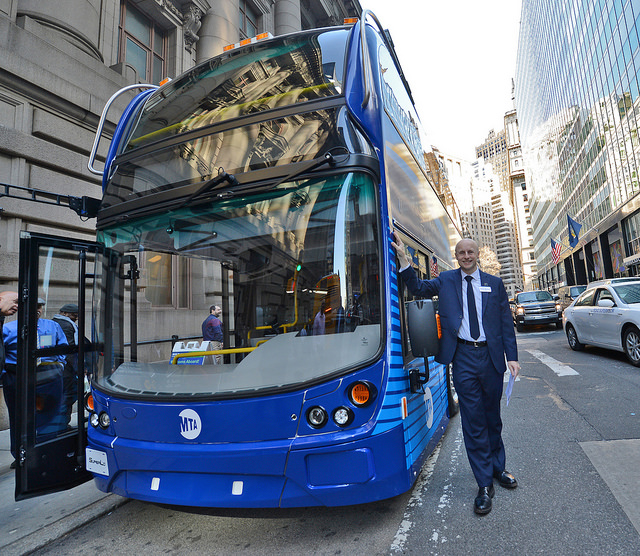After years of declining bus speeds that have repelled increasing numbers of people from the city's surface transit system, there's light at the end of the tunnel for NYC bus riders.
New York City Transit President Andy Byford and his team at the MTA unveiled their "bus action plan" this morning, promising citywide all-door boarding, more priority for buses on the streets, and a complete reevaluation of the bus network, which hasn't changed much in decades.
The action plan takes many cues from the policy prescriptions advocates first laid out two years ago in their Bus Turnaround Campaign. The MTA had been hesitant to commit to those recommendations, but under Byford the tone has changed.
Every strategy in the plan has a timetable: Tap-and-go farecard readers will be on every bus by the end of 2020. A complete review and redesign of the bus network will wrap up by 2021, with targeted improvements beginning this year. Also this year, the MTA will increase off-peak service on certain routes.
"We are deliberately tying ourselves, committing ourselves, if this plan is adopted, to time-bound, tangible, commitments -- short-term, medium-term, and long-term -- to which I and my management team will expect to be held accountable," Byford said at an MTA board meeting. "We really are proposing the top-to-bottom transformation of our bus network."
The action plan also calls for better bus dispatching to prevent bunching, more real-time arrival displays, and new buses -- including pilots for electric buses and double-decker buses.
The items that call for on-street transit priority -- more bus lanes and more traffic signals that minimize red light time for buses -- will require coordination with NYC DOT and NYPD.
Keeping bus lanes clear hinges on NYPD buy-in especially. Blocked bus lanes are a major obstacle to improving service, and police themselves are the worst violators in the city.
The MTA envisions bus lane enforcement as a more specialized task, which may or may not be conducted by NYPD. The bus action plan proposes "dedicated transit-priority traffic teams" that could be staffed by NYPD or another agency. The agency is also looking for Albany to pass legislation enabling more enforcement cameras mounted on buses.
All told, the plan includes the ambitious, comprehensive, and specific targets that advocates have wanted to see from the MTA since they launched the Bus Turnaround Campaign in July 2016.
MTA leadership initially showed wavering interest in tackling the systemic problems that plague NYC bus service and erode ridership. When the agency unveiled the procurement for a new fare payment system, for instance, they only committed to a pilot of all-door boarding. Officials were narrowly focused on whether the policy would increase fare evasion.
The announcement of the bus action plan indicates that the MTA has adopted a different outlook and is more willing to embrace the changes necessary to turn around bus service. "Today, we are celebrating," Riders Alliance organizer Stephanie Burgos-Veras told MTA board members. "This is a plan that will modernize our bus system, and it will change the way that we move around the city."






